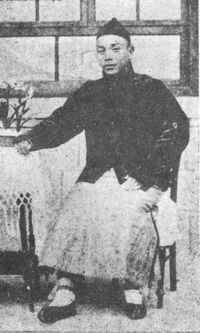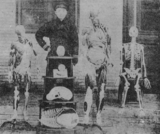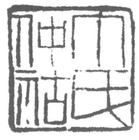Views
Dīng Fúbǎo 丁福保 (1874-1952)
|
| Notable Associates: |
|
Dīng Fúbǎo 丁福保 (1874-1952) was a writer, scholar and publisher of works on medicine, philology, numismatics, and religion. His best-known Buddhist work is his Fójiào dà cídiǎn 佛學大辭典 (Great Dictionary of Buddhism) first published in 1922, based on Bukkyō daijiten by Oda Tokunō 織田得能 and several other sources.
Contents |
Biography
Dīng was born in Wúxí 無錫, Jiāngsū 江蘇 into a family with a scholarly background. His paternal grandfather had been a county magistrate in Zhèjiāng 浙江. In 1894 he taught in a local home-school 家塾 run by the famous book collector Lian Nanhu 廉南湖 (1868-1931), and in 1895 tested into the Nánqīng Academy 南菁書院 in Jiāngyīn 江陰, where one of his classmates was Jiǎng Wéiqiáo 蔣維喬. In 1896 he became a scholarship student in training for the civil service examinations (shēngyuán 生員) in Wúxí 無錫. He would go on to study at Dōngwú University 東吳大學 in Sūzhōu 蘇州. He also studied chemistry in Shànghǎi 上海, Japanese at the Fúzhōu Japanese School 東文學堂 in Fúzhōu 福州, and medicine from Zhào Yuányì 趙元益. He taught in the School of Translation Studies 譯學館[2] at Imperial Capital University 京師大學堂[3]. Around 1900 he left his teaching position (reportedly because of poverty) and began his study of medicine, although he would continue to teach mathematics and physiology for short stretches of time. Late in 1902 he founded Wenming Books 文明書局 with Lián Nánhú and another friend, which began by publishing translations from the Japanese and of Western histories. In 1903 while traveling in Nánjīng 南京 he met the lay Buddhist publisher Yáng Wénhuì 楊文會.[4] Some accounts say that the next year he happened to read a copy of Recorded Sayings of the Shakyas (Shishi yulu 釋氏語錄) which sparked his interest in Buddhism.
His medical practice brought an increased income, much of which he spent on rare books, the beginning of a life-long love of literature and publishing. In 1908, after his Translation Society 譯書公會 in Wúxí went bankrupt, he established the Medical Press 醫學書局 in Shànghǎi. In 1910 he traveled to Japan to research medicine there, and later translated and published Japanese medical texts through his press. During his lifetime he wrote and published on many subjects, including philology, textual studies, numismatics, medicine, Buddhism, textual collation, and so on.
In 1914 his mother died and Dīng nearly died of illness, after which he kept a vegetarian diet and began to believe more strongly in Buddhist teachings. He would remain a committed vegetarian for much of his life. In 1918 he began publishing his Buddhist Studies Collectanea 佛學叢書 through his Medical Press.[5] The scholar Méi Guāngxī 梅光羲 helped edit and select many of the pieces in the volumes. He is said to have spent over ten years translating his Great Dictionary of Buddhism 佛學大辭典, which was published in 1922. His Medical Press would become one of the major publishers of Buddhist books in the Republican period, perhaps second only to Shanghai Buddhist Books 上海佛學書局 in terms of the number of Buddhist titles published. Many of the publications were funded by donations, and he never derived any profit from his work publishing scriptural texts. By 1924 he felt that his work of republishing Buddhist texts was completed. His press also published Daoist texts, such as Essential Records of the Daoist Canon (道藏精華錄, 1926) and Continuation Volume of the Daoist Canon (道藏續編, 1930?).
Dīng donated several tens of thousands of books and printed materials to Shanghai University 上海大學, Beijing University 北京大學, Wúxí University 無錫大學, and Aurora University 震旦大學. He also donated his house in Wúxí to the Wúxí Buddhist Association 無錫佛學會. He also sat on the board of directors for Shanghai Buddhist Books 上海佛學書局, the most important Buddhist publishing house in China in the first half of the 20th century. He continued to practice medicine almost daily throughout his life, one reason perhaps why he had few contacts with the larger Shanghai Buddhist community.[6]
Important Works
- Buddhist Studies Collectanea 佛學叢書, 1918 - about 1924, with reprints and additions until the 1940s
- Annotated Avalokitêśvara Sūtra 觀世音經箋註, 1918
- Annotated Diamond Sūtra 金剛般若波羅蜜經箋註, 1918
- Annotated Ullambana Sūtra 盂蘭盆經箋註, 1918
- Annotated Amida Sūtra 阿彌陀經箋註, 1918
- Annotated Sūtra of Immeasurable Life 無量壽經箋註, 1918
- Annotated Sūtra of the Meditation on the Buddha of Immeasurable Life 觀無量壽佛經箋註, 1918
- This text includes a set of woodblock images. See the gallery in the bibliographic article for more details.
- Annotated Sūtra of Unlimited Meanings 無量義經箋註, 1918
- Annotated Heart Sūtra 般若波羅蜜多心經箋註, 1918
- Awakening of Faith in Buddhist Studies 佛學起信編, 1919
- Guide to Buddhist Studies 佛學指南, 1919
- Records of Transmigration Through the Six Kinds of Rebirth 六道輪迴錄, 1919
- Annotated Platform Sūtra of the Sixth Patriarch 六祖壇經箋註, 1919
- Short Dictionary of Buddhism 佛學小辭典, 1919
- Essentials of Buddhist Studies 佛學撮要, 1920
- Initial Stages in Buddhist Studies 佛學初階, 1920
- Foundations of Buddhist Studies 佛學之基礎, 1920
- Discourse on Studying Buddhism Experimentally 學佛實驗譚, 1920
- Record of the Miraculous Response of Guānshìyīn Bodhisattva 觀世音菩薩靈感錄, [1920]
- Detailed Annotated Heart Sūtra 心經詳註, 1920
- Shortcut to Studying Buddhism 學佛捷徑, 1921
- Great Dictionary of Buddhism 佛學大辭典, 1922
- Probably Dīng's best-known work. Full-text is in the public domain and is available online. See the bibliographic article for more information.
Gallery
| Dīng Fúbǎo and his works | |||||||||
| |||||||||
Notes
- ↑ This name has a strong Daoist flavor, and is used in his Daoist publications. See Liu Xun, Daoist Modern: Innovation, Lay Practice, and the Community of Inner Alchemy in Republican Shanghai (Cambridge, MA: Harvard University Press, 2009), 37.
- ↑ Formerly the School of Combined Learning 同文館, established in 1862
- ↑ Established in Běijīng 北京 in 1898, later to become Beijing University
- ↑ See Chouyin jushi ziding nianpu 疇隱居士自訂年譜, 318.
- ↑ Often referred to as "Mr. Ding's Buddhist Studies Collectanea" 丁氏佛學叢書.
- ↑ Although he does mention attending regular Sunday meetings of the Layman's Association 功德林 in Shànghǎi. See Dīng, Chouyin jushi ziding nianpu 疇隱居士自訂年譜, 395.
References
- Baidu article on Ding
- HTML version of Foxue da cidian 佛學大辭典
- Cai Yunchen 蔡運辰, ed. Dingshi foxue congshu 丁氏佛學叢書. Taipei: Beihai, 1970.
- This is a photocopy reprint of Ding's series.
- DDBC Person Authority Database 人名規範檢索
- Dīng Fúbǎo 丁福保. Chouyin jushi ziding nianpu 疇隱居士自訂年譜. In Qingdai minguo cangshujia nianpu 清代民國藏書家年譜, edited by Zhang Aifang 張愛芳 and Jia Guirong 賈貴榮, 291-424. Beijing: Beijing tushuguan chubanshe, 2004 [1929].
- Shì Dōngchū 釋東初. Zhōngguó Fójiào jìndài shǐ 中國佛教近代史 (A History of Early Contemporary Chinese Buddhism), in Dōngchū lǎorén quánjí 東初老人全集 (Complete Collection of Old Man Dongchu), vols. 1-2. Taipei: Dongchu, 1974. Pp. 2.647-650.
- Yú Língbō 于凌波. Zhōngguó jìnxiàndài fójiào rénwù zhì 中國近現代佛教人物志. Beijing: Zongjiao wenhua chubanshe, 1995. Pp. 423-431.




